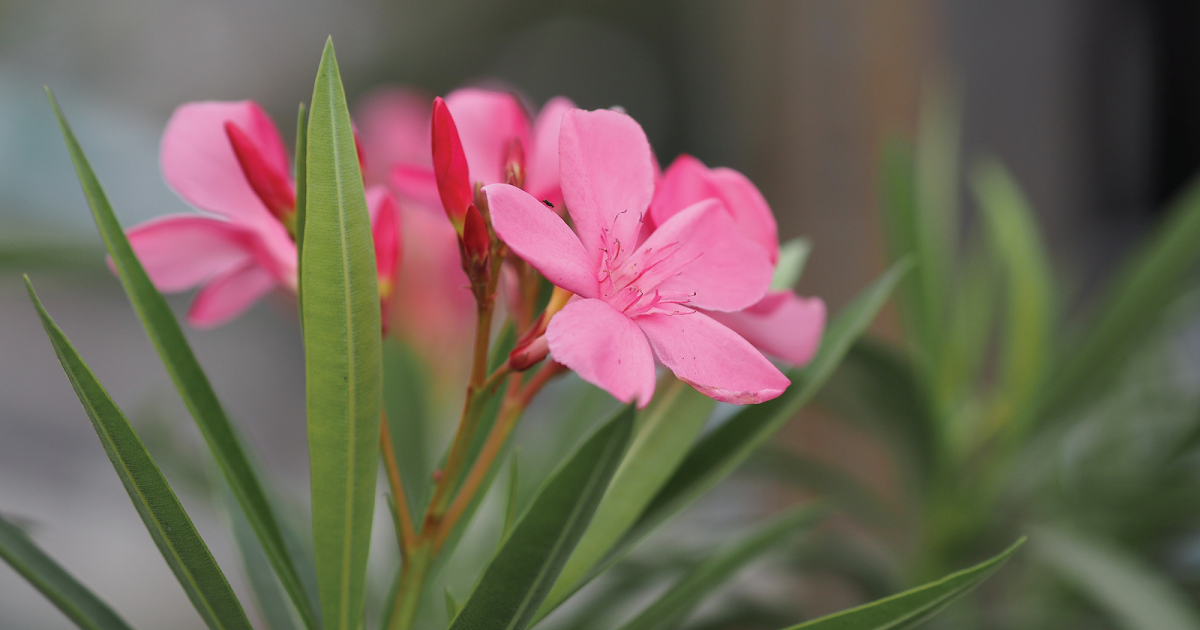
Oleander Is a Deadly Plant, Not a COVID-19 Cure
While there’s evidence to support the use of several nutrients and supplements in the fight against COVID-19, oleandrin, a compound from the oleander plant, is not one of them. Rumors about the possibility of an oleandrin remedy have been swirling in recent weeks following the posting of a study1 on the preprint server bioRxiv, in which oleandrin was found to inhibit the replication of SARS-CoV-2 in vitro.
September 2, 2020 | Source: Mercola.com | by Dr. Joseph Mercola
While there’s evidence to support the use of several nutrients and supplements in the fight against COVID-19, oleandrin, a compound from the oleander plant, is not one of them.
Rumors about the possibility of an oleandrin remedy have been swirling in recent weeks following the posting of a study1 on the preprint server bioRxiv, in which oleandrin was found to inhibit the replication of SARS-CoV-2 in vitro. According to the authors:2
“Typically, the fastest route to identifying and licensing a safe and effective antiviral drug is to test those already shown safe in early clinical trials for other infections or diseases. Here, we tested in vitro oleandrin, derived from the Nerium oleander plant and shown previously to have inhibitory activity against several viruses …
When administered both before and after virus infection, nanogram doses of oleandrin significantly inhibited replication by up to 3,000-fold, indicating the potential to prevent disease and virus spread in persons recently exposed to SARS-CoV-2, as well as to prevent severe disease in persons at high risk.
These results indicate that oleandrin should be tested in animal models and in humans exposed to infection to determine its medical usefulness in controlling the pandemic.”
Do Not Attempt to Use Oleander as a Home Remedy
It’s important to note that this was an in vitro test, meaning these results were observed in a cell culture. It has not been tested on animals or humans. The reason this is a crucial distinction is because the oleander plant is well-known for its extreme toxicity.
The fact that it killed the virus in a cell culture does not suggest it would be an effective remedy for the simple fact that its high toxicity just might kill the patient along with the virus. So, please, DO NOT attempt to use this plant as a home remedy against COVID-19.
Oleander grows well in subtropical climates such as Florida, and is toxic to pets. I strongly advise against growing oleander in your yard if you have pets or small children (and if you do, make sure they’re supervised around the plant), or harvesting the plant as a potential remedy. The results could be lethal.
This is definitely an instance in which we must allow scientists to methodically work through the scientific process to determine if, in fact, there’s a way to turn oleandrin into a useful drug.
American Botanical Council Issues Advisory
Among those who have issued urgent advisories against the use of oleander is the American Botanical Council (ABC), also known as the Herbal Medicine Institute — an independent, nonprofit research and education organization.3
When it comes to plants, herbs and botanicals, they are a premiere expert resource. In an August 18, 2020, advisory, the ABC warns consumers against producing oleander-based home-remedies due to the plant’s extreme toxicity:4
“ABC warns consumer not to ingest any parts of the plant, or capsules, tablets, teas, or extract preparations made from leaves or other parts of the oleander plant because it contains chemicals that can cause serious effects to the human heart, including death …
Oleander is a large white- or pink-flowering bush or small tree that is grown as an ornamental plant in many parts of the United States and elsewhere, including north Africa, the Mediterranean, and southwestern Asia.
All parts of the plant contain a poisonous substance called oleandrin, known technically as a cardiac glycoside, and other similarly toxic constituents. The structure of oleandrin and its activity are similar to digoxin, a glycoside from the equally toxic foxglove plant … Digoxin is a pharmaceutical drug used in conventional cardiology for heart failure and irregular heartbeat.
ABC does not know of any extracts or dietary supplement products sold in the U.S. that contain oleander. Oleander plant parts and its extracts are not sufficiently safe to be sold in dietary supplements …
According to ABC Founder and Executive Director Mark Blumenthal, ‘To be clear, ABC applauds appropriate scientific research into medicinal plants and fungi as sources of new medicines. We also acknowledge the very promising medical research conducted by Phoenix Biotechnologies and their oleandrin formulations.
However, ABC emphasizes the distinction between a scientifically studied, chemically-defined experimental new drug compound from a widely known poisonous plant and a simple home-made pill, tea, or extract made from the plant’s various parts.
With respect to oleander, all parts of the plant are highly toxic, dangerous, and life-threatening when ingested. Consumers should not, ever, try to make a home-made remedy from or self-treat with oleander.’”
